Should you clean your solar panels? If the answer is ‘yes’, then how often should you clean your solar panels – and what’s the best way to clean them? How to clean solar panels? These are questions that many solar system owners have asked themselves. Solar Choice recently had the opportunity to catch up with Leanne Masters of Lime Solar Cleaning – an Australia-wide solar panel cleaning service – to get answers to these questions and more.
Q: Why do solar panels need cleaning (and checking)?
Although it doesn’t really occur to many people, solar panels can get quite dirty. There are many external influences that can make a panel dirty, including dust and road grime, salt spray and bird or bat droppings to name a few.
A photovoltaic (PV) system performs best with completely unobstructed access to the sun’s rays for most or all of the day. Even something as seemingly inconsequential as a residue layer can affect the performance of your panels, while bigger spots & obstructions can have a much greater impact that is disproportionate to their size.
Bird droppings on solar panels.
Accumulation of sea spray/salt on a solar panel.
On top of cleanliness, there are numerous other issues that may crop up over a system’s lifetime that may go unnoticed, especially when seen by an untrained eye. For example, a panel may have developed cracks as a result of hail or other falling objects, or parts of the racking may have come loose.
A crack on the glass of a solar panel.
A loose clamp on a solar panel.
Q: How much more productive are solar panels when they are clean?
In the past, it was generally accepted that the rain would clean the panels. More recently, this conventional wisdom has come into question with new discussion and articles on the subject.
This is an interesting article on the analysis of dust losses in photovoltaic modules. It was conducted for the World Renewable Energy Congress in Sweden. It highlights that dust buildup does have a significant effect on solar energy production – contrary to popular thinking on the matter.
A good analogy is with your car windscreen: If you leave you car sitting outdoors for a few weeks, the buildup on this glass would make it difficult to see through without cleaning it. Even if it has cleaned, you would still need to clean it with the wipers or other means – and even then, with more driving it will get too dirty to see through again.
Likewise, having dust, grime or buildup on your panels can reduce your system’s energy yields by up to 25% – and associated reductions in energy bill savings
Q: How often should solar panels be cleaned?
Unfortunately, it is often the case that the installation date the last time a solar system owner ever looks at their panels – until something goes wrong.
We at Lime Solar Cleaning recommend that panels be cleaned and inspected at a minimum once every six months. Cleaning at regular intervals prevents buildup of residue and keeps your panels operating optimally at all times.
Regular checks can also prevent cracks or fire risks from developing into something worse – but you’ll need to know what you’re looking for in order to identify these issues in the first place.
Q: How should you clean the panels?
Whereever and whenever possible, panels should be cleaned using purified water and a soft brush. Panels should not be cleaned with a pressure washer, as doing so could result in cracked glass. Abrasives and chemicals should also be avoided, as both can result in ‘rough spots’ on the panels where dirt is likely to accumulate.
Also remember that you should never put pressure on the panels by stepping or putting weight on them.
Solar panel cleaning using soft brush and de-ionised water.
Q: What are the benefits of having your solar panels cleaned by a professional as opposed to cleaning them yourself?
Tap water and chemicals can leave a residue on your panels that can inadvertently encourage dirt to accumulate. This is one of the reasons that having your panels cleaned professionally is a good idea. Using a de-ionised water system (as Lime Solar does) to give an effectively spot free finish that is more resistant to becoming dirty will also give you a better result with a longer-lasting impact. De-ionised water systems are not generally worth the investment for individual homeowners who plan to use them only for window cleaning, but a good professional cleaner will have one as a matter of course.
Another part of having a trained professional do the job is that they can check other aspects that can affect the health and performance of your system. These include potential fire safety issues, cracks, hot spots and nests from uninvited guests like birds, rats and possums. Detecting issues like crazing (ie. webs of small cracks) and delamination (i.e. peeling off of laminate layer) are also essential to to ensure a system running well.
Another reason to go professional is safety: Getting on your roof can be a dangerous business, especially without good safety gear. Without the right gear and experience, you could put yourself at risk or potentially injure yourself (not to mention potential run-ins with wasps…).
A wasp nest underneath a solar panel.
Find out more about Solar Panel Cleaning and Costs:
https://www.solarchoice.net.au/blog/solar-panel-maintenance-costs-methods-cleaning
© 2016 Solar Choice Pty Ltd
- APsystems Battery Review: An Independent Assessment by Solar Choice - 18 December, 2025
- Running Cost of Air Conditioners – Explained - 7 October, 2025
- Air Conditioner Rebate South Australia: What You Need to Know - 19 September, 2025
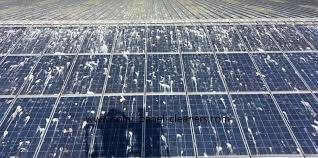
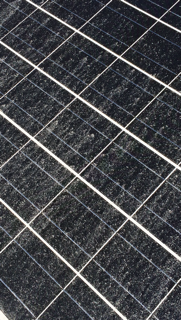
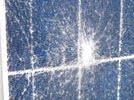
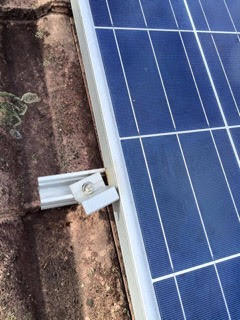
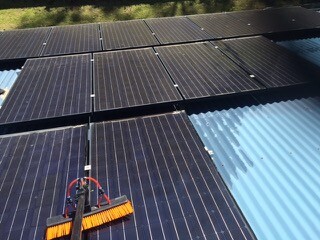
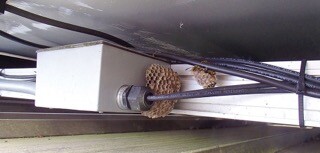
I didn’t know that tap water can inadvertently encourage dirt to accumulate. My husband and I have been considering getting solar panels installed. It’s good to know beforehand what kind of care it would need to be maintained.
have you any panel cleaners for hope island gold coast,,or toowoomba regards graham
Hi Graham,
You might want to try contacting Lime Solar Cleaning via the details in this article – they’ve apparently got a network of cleaners across Australia.
Best of luck!